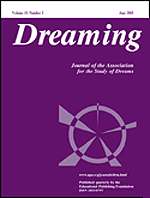 Children’s Dreams: Notes from the Seminar Given in 1936-1940 by C.G. Jung, edited by Lorenz Jung and Maria Meyer-Grass, translated by Ernst Falzeder with the collaboration of Tony Woolfson (Princeton University Press, 2008).
Children’s Dreams: Notes from the Seminar Given in 1936-1940 by C.G. Jung, edited by Lorenz Jung and Maria Meyer-Grass, translated by Ernst Falzeder with the collaboration of Tony Woolfson (Princeton University Press, 2008).
This new English translation of C.G. Jung’s seminar on the earliest remembered dreams of childhood marks a dramatic advance in the study of Jungian dream theory. The book makes available to English readers a fascinating, informative, and thought-provoking source of insight into Jung’s practical approach to dream interpretation. It will appeal to anyone who wants to learn more about how Jung actually worked with dreams. The book will also serve as an important resource for teachers and researchers in their use and/or criticism of Jung’s psychology of dreams. Although the title suggests a narrower focus, Children’s Dreams in fact provides the best single source for understanding the broader dimensions of Jungian dream theory.
From 1936 to 1940 Jung taught the seminar at the Swiss Federal Institute of Technology in Zurich. The participants included some of his brightest followers, including Marie-Louis Von Franz, Aniela Jaffe, and Jolande Jacobi. Each meeting of the seminar involved one of the participants presenting and analyzing an early childhood dream report (or brief dream series), after which Jung would comment and other participants would ask questions and respond to Jung’s ideas. We cannot know how faithfully the transcript represents what actually happened in the seminar, but the written text does give the strong sense of a lively, intelligent, free-flowing conversation among people who knew Jung’s theories very well and wanted his guidance in applying them.
Virtually no mention is made of the ominous political situation in Europe at this time, i.e., the rise of Hitler and the Nazis in Germany and the outbreak of World War II. A Jung critic might take this as a retreat from the real problems of the world into the self-reinforcing fantasy world of dream symbolism. A more sympathetic reader might wonder if the seminar participants found this work so compelling precisely because they knew that dark forces were afoot and they wanted to gain better practical insight into the deep psychological roots of the darkness threatening their civilization.
The first chapter, Jung’s introductory lecture to the class, is itself worth the price of the book. In clear, straightforward language Jung lays out the basic principles and themes of his approach to dream interpretation. He puts special emphasis on the earliest remembered dreams of childhood because these types of dreams often relate to primordial themes in the collective unconscious and thus offer an especially good view of archetypal dynamics. In this Jung highlights a key notion in his overall psychological system: “[T]he unconscious is older than consciousness….The unconscious is what is originally given, from which consciousness rises anew again and again.” (7) Children have less conscious superstructure than adults and thus more direct exposure to oneiric blasts from the collective unconscious. This is not always a good thing. On the contrary, one of the remarkable features of the dreams presented in the book is their relentlessly negative, violent, frightening character. Most of the dreams are nightmares, many of them recurrent. This may reflect the fact that the seminar participants drew most of the dream reports from their clinical practices with people suffering psychophysiological problems. It may also reflect what Jung considered the numinous power of the archetypes, their overwhelming energy and consciousness-stretching impact on people, particularly early in their lives.
In the introduction Jung lays out his method of analyzing dreams in terms of a four-part dramatic structure:
1. Locale: Place, time, ‘dramatis personae.’
2. Exposition: Illustration of the problem.
3. Peripateia: Illustration of the transformation—which can also leave room for a catastrophe.
4. Lysis: Result of the dream. Meaningful closure. Compensating illustration of the action of the dream. (30)
Each dream in the book is analyzed according to this structure. This creates a helpful unity across the length of the book, which at 468 pages requires an extensive commitment of time and energy to read all the way to the end. For teaching and reference purposes the book can be read piecemeal, in selections of one or two dream discussions (each one goes for 10-15 pages). But we found real value in reading the book start to finish because many of the most interesting exchanges between Jung and the participants pop up unexpectedly in reference to different dreams. As the seminars proceed Jung refers back to previous dreams and their analyses, so there is definitely a cumulative quality to the text.
Jung’s Children’s Dreams will not, in all likelihood, satisfy contemporary researchers who ask about the reliability of memory processes in dream recall, particularly dreams that people are remembering from many years in the past. Nor will those who question Jung’s assumption about the universality of the archetypes find any reason to give up their skepticism. But for those who already appreciate and value Jungian dream theory, Children’s Dreams will be a cause for joy. The book is comparable to Freud’s epic Interpretation of Dreams (1900) in providing a rich, complex, highly detailed exposition of Jung’s psychology of dreams and dream interpretation.
(Originally published in DreamTime 2009, co-authored with KB’s mother, Patricia Bulkley)





 The April 2010 issue of the
The April 2010 issue of the